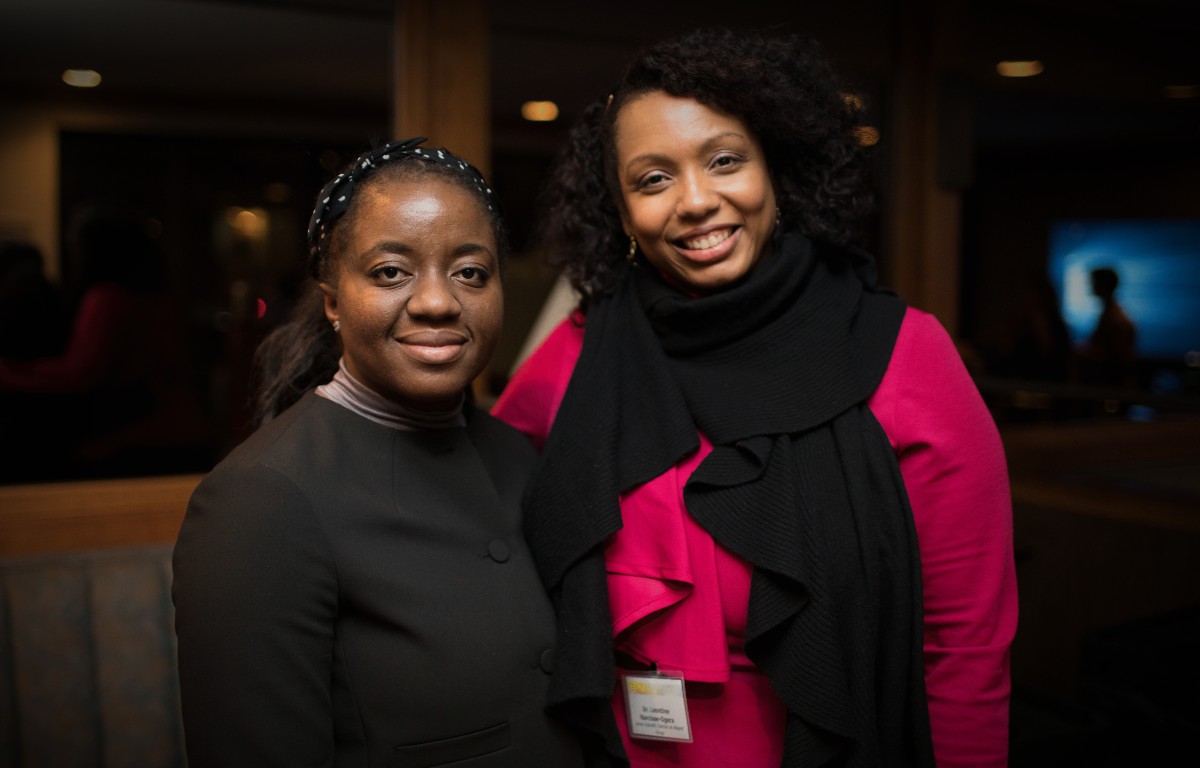
L-R, the author at Einstein’s Women in Science Day with Leontine Narcisse-Ogera, M.D., Ph.D., Einstein alum and event speaker.
What if someone found out that I wasn’t the scientist I claimed to be?
This was one of the thoughts that often flooded my mind. As a Nigerian American physician-scientist in Einstein’s M.D./Ph.D. program, I took pride in what I accomplished. I was brought up to understand that many people would happily trade places with me. Yet I couldn’t shake the feeling that I didn’t quite fit in as a scientist or as a physician. For years, I was one of a handful of African American women in a classroom, if not the only one. I would often question myself and shy away from various experiences out of fear.
These concerns had crept into my world, hindering my interactions with others—even after I attended prestigious meetings and national conferences where I effectively presented my research in poster and oral presentations. These nagging doubts about myself would also often reoccur even after I received various honors and awards, followed by positive feedback from mentors.
What was going on? I wondered. The answer came at a national conference I attended later in my training, where I learned that such feelings were associated with what’s called “imposter syndrome.” Finally, my worry and self-doubt had a name—and I came face to face with it after completing my M.D. studies at Einstein.
Women in Science Day
I reflected on my own emotional and professional journey during the first-ever Women in Science Day at Einstein, when financial advisor Magdelena Johndrow, who led a salary negotiation workshop, said something that resonated with me not just on the financial level, but personally. “You are where you are on your merits, not on luck,” she said. While it’s important for all people to have that level of confidence, I believe it’s something women, and women of color especially, ought to understand.
According to a 2008 article in Harvard Business Review, “imposter syndrome can be defined as a collection of feelings of inadequacy that persist despite evident success. ‘Imposters’ suffer from chronic self-doubt and a sense of intellectual fraudulence that override any feelings of success or external proof of their competence.” The article also noted that “imposter syndrome doesn’t equate with low self-esteem or a lack of self-confidence. In fact some researchers have linked it with perfectionism, especially in women and among academics.”
That syndrome would play a large part in my career choices and my self-esteem as I left the pursuit of medicine and dedicated myself to a career in science.
For women of color, it’s understandable why such feelings can be an issue. Negative experiences during my training flooded my mind in times of stress, as I remembered times when my comments were ignored or overlooked in discussions, or when classmates would make comments about how affirmative action had favored me. All of this left me feeling that others expected me to fail. It became hard for me to celebrate myself.
Facing Doubts, Finding Success
My own liberation from imposter syndrome came from learning to live more courageously and changing my mindset from one of being a victim to one of being victorious and establishing the belief that everything works out for the better.
The process started after I had to withdraw from Einstein’s medical program and give up my match spot to do my residency at New York University. It was a difficult decision and a challenging time in my life, but I was determined to take time to reflect on and uncover the ways in which fear had inhibited me throughout my career. I learned that worrying about various opinions and thoughts that in the grand scheme of my life didn’t matter had stopped me from seeking the right help. Fear of being a failure caused me to ignore indications of my changing professional desires and almost led me to a mental breakdown. Finally, I stopped looking at myself through the lenses of others, instead using my faith to see myself as my Father does—through the lens of love and compassion. I became confident and now know that I am capable; that I can do difficult things (in and outside the lab); that I belong; and that I can decide the right direction for my life.
I accepted that it’s fine, in other words, not to know everything; no one does.
To stay free from that “imposter” mindset, I’ve continued to work hard and focus on my goals. I’ve especially found it necessary to reassess all criticisms, addressing those that can be fixed while discarding those that should be ignored. Instead of seeing criticism as a personal attack, I now use it as an opportunity to continue to improve and grow.
No one is an island. For that reason, I believe that we should always express gratitude to the people and circumstances that have aligned to help us attain our level of success. I will be forever grateful to my high school guidance counselor, who helped a teenager only two years in the United States through the confounding process of college applications. My undergraduate mentor, Hsien-Yu Wang, Ph.D., always saw the scientist in me and was the first to suggest that I pursue a Ph.D. At Einstein, my grad school and postdoc mentors, Ulrich Steidl, M.D., Ph.D., and Britta Will, Ph.D., each challenged me and encouraged me to challenge myself to pursue opportunities that I would normally have shied away from.
Today, I am at Einstein investigating cancer pathogenesis, and seeking to make my own unique contributions to science. No imposter could do that.

